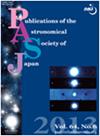极贫金属AGB星s过程核合成三种模式的比较研究
IF 2.2
4区 物理与天体物理
Q2 ASTRONOMY & ASTROPHYSICS
引用次数: 0
摘要
银晕中的碳增强贫金属(CEMP)恒星具有广泛的中子捕获元素丰度模式。为了确定它们的起源,我们研究了三种被提出在极贫金属(EMP)渐近巨星分支(AGB)恒星中运行的$s$过程核合成模式:低质量AGB恒星中氢被氦闪对流吞没时发生的对流13C燃烧,中质量AGB恒星中氦闪对流中发生的对流22Ne燃烧,以及在脉冲间隔期间形成的$^{13}$C口袋中发生的辐射13C燃烧。我们发现,每颗铁种子产生的$ $ $过程元素($ $ $过程效率)并不取决于$[{\rm Fe}/{\rm H}]=-2$以下的金属丰度,因为氦区的16O主导了中子中毒。对流13C模式可以产生Sr, Ba和Pb的各种$s$过程效率,包括在CEMP恒星中观测到的最大值。在CEMP模型中,22Ne模式只能产生最低端的$ 5 $流程效率。我们表明,这两种模式的结合可以解释在CEMP恒星中观测到的$s$过程元素富集的全部范围。相比之下,即使考虑到13C口袋质量的恒星间变化,13C口袋模式也很难解释在一些CEMP恒星中观察到的高富集水平。这些结果为讨论CEMP恒星及其亚群的二元传质起源提供了基础。本文章由计算机程序翻译,如有差异,请以英文原文为准。
A comparative study of three modes of s-process nucleosynthesis in extremely metal-poor AGB stars
Carbon-enhanced metal-poor (CEMP) stars in the Galactic halo have a wide range of neutron-capture element abundance patterns. To identify their origin, we investigated three modes of $s$-process nucleosynthesis that have been proposed to operate in extremely metal-poor (EMP) Asymptotic Giant Branch (AGB) stars: the convective 13C burning, which occurs when hydrogen is engulfed by the helium flash convection in low-mass AGB stars, the convective 22Ne burning, which occurs in the helium flash convection of intermediate-mass AGB stars, and the radiative 13C burning, which occurs in the $^{13}$C pocket that is formed during the inter-pulse periods. We show that the production of $s$-process elements per iron seed ($s$-process efficiency) does not depend on metallicity below $[{\rm Fe}/{\rm H}]=-2$, because 16O in the helium zone dominates the neutron poison. The convective 13C mode can produce a variety of $s$-process efficiencies for Sr, Ba and Pb, including the maxima observed among CEMP stars. The 22Ne mode only produce the lowest end of $s$-process efficiencies among CEMP models. We show that the combination of these two modes can explain the full range of observed enrichment of $s$-process elements in CEMP stars. In contrast, the 13C pocket mode can hardly explain the high level of enrichment observed in some CEMP stars, even if considering star-to-star variations of the mass of the 13C pocket. These results provide a basis for discussing the binary mass transfer origin of CEMP stars and their subgroups.
求助全文
通过发布文献求助,成功后即可免费获取论文全文。
去求助
来源期刊

Publications of the Astronomical Society of Japan
地学天文-天文与天体物理
CiteScore
4.10
自引率
13.00%
发文量
98
审稿时长
4-8 weeks
期刊介绍:
Publications of the Astronomical Society of Japan (PASJ) publishes the results of original research in all aspects of astronomy, astrophysics, and fields closely related to them.
 求助内容:
求助内容: 应助结果提醒方式:
应助结果提醒方式:


